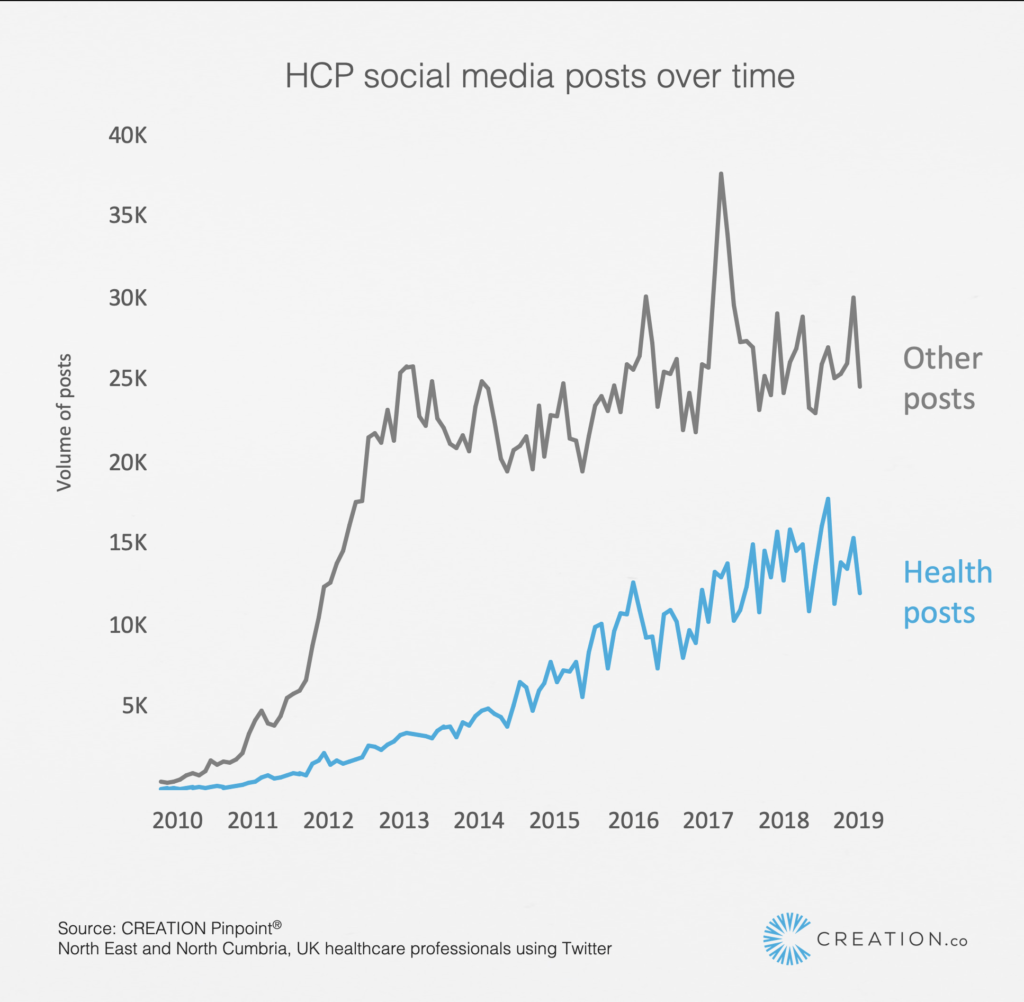This article was originally written for and published in the September 2019 edition of PMLiVE.
For the past three decades the internet has been changing lives and social media has played a very large role in that. Major social platforms have come and gone but some big players have remained a part of everyday life for hundreds of millions of users. Facebook, Instagram, Sina Weibo, Tik Tok, Twitter and Reddit, to name a few, have changed the way individuals interact with each other across the globe as well as the data available to them on the world wide web.
From face to face to social media
We have seen healthcare professionals (HCPs) joining these social networks and the online conversations at the same rate as non-HCP users. At the end of the last decade, with many global interactions between HCPs made possible through social media, the health industry and health systems were poised for disruptive change.
From static to mobile
After HCPs joined social media channels, the transition began from using these platforms statically on large desktop screens to using them at their place of work, or on the go – whenever, wherever.
Twitter, as an example, for the first six years after its founding was primarily used as a computer-based platform by HCPs. The use of Twitter for iPhones only took over this lead in 2012, at a time when the use of social media on other mobile devices such as Blackberry was also on the rise, although this itself was quickly overtaken by Android. iPad was on a solid growth trajectory from 2011 to 2016 but it has been used less frequently over the last three years. Based on our research, in today’s world, we see that social media is primarily consumed by HCPs on mobile devices.
Many of the social networks still experiencing success today started as website-based networks such as Facebook, Twitter and Reddit, while others like Instagram, Snapchat and Tik Tok have been birthed in the mobile age. It has become clear that in order for a social network to survive, it must be available as a mobile app and have an excellent mobile user interface to support this trend.
For pharmaceutical or healthcare marketers hoping to engage influential HCPs in the digital age, it is important to think mobile. One recent example of this came from Pfizer’s Twitter account as they shared a portrait orientated video showing ulcerative colitis (UC) patients discussing how they felt opening up about their experience of living with UC, with captions. Captions have proved a useful feature for mobile users as content is often viewed without audio enabled so the words being communicated can still be viewed.
It is easy to scroll through a feed of pharma content on a platform like LinkedIn and see the adaptation to visual-focused posts. Vibrant images and videos pass by but just a few have been created in the aspect ratio for a mobile viewer. On a web browser 16:9 videos stretch across the screen with a widescreen, big picture experience while on the mobile they are constricted begging for the device to be rotated as the user scrolls on by.
From general to health conversation
These changes became highly meaningful for the way HCPs practice medicine and for pharmaceutical companies when the conversations and behaviours became health focused. Healthcare professionals use social media to connect with friends and family as many others do, but there has been a steady increase in the volume of HCP conversations on social media relating to healthcare and medicine and this shows no signs of stopping.
On Twitter, HCP conversations increased dramatically in 2012 with a record number of HCP tweets being posted. But these were not tweets about healthcare. At that time, the level of healthcare related conversations was relatively low compared to the overall conversation. Over time however, the health conversation has grown to become, at times, half of all HCP Twitter conversations. HCPs are becoming increasingly comfortable with discussing health topics including the latest treatment options, clinical trial results and patient care, not only on private, but public social media.

As HCPs have embraced mobile social networks, new opportunities have arisen to improve healthcare. We have seen HCPs using public social media such as Facebook, Twitter and Reddit to consult with one another around specific patient cases. Other apps designed exclusively for HCP use have emerged, providing a platform for them to do this in a private or anonymous way. For example, SERMO facilitates peer discussion; where physicians ask one another medical questions based on real patient cases anonymously in a forum style. On another doctors’ network, Figure1, HCPs ask for peers’ views as they share images of patient ailments.
Tracking digital behaviours
Understanding what is resonating with HCPs is essential in order for health companies and organisations to effectively engage with them. To do this, many companies now choose to follow and track what HCPs say and do online. While large shifts in HCP use of digital media have been observed, when tracking HCP conversations and digital behaviours, smaller changes that occur on a daily basis have been discovered. All of this together can provide a rich resource of intelligence but asking the right questions of that data is important to gain actionable insights.
The interests of HCPs can be found in both the content they share and from the public online conversations they have. When putting together a marketing strategy, content plan or engagement programme it is highly important to know which congress meetings boost HCP online activity, which hashtags are producing the most interesting conversations, and on which channels HCPs are most active.
Building outreach strategies
Discovering HCP digital behaviours and keeping track of the changes over time makes the difference when aiming to understand HCP opinions and unmet needs. There is much data showing that the professional lives of HCPs are being transformed by digital. From this data, powerful and effective value adding outreach strategies can be built. The question remains: which companies will be willing to not only use digital to engage HCPs but will carry out digital market research to transform their business structures, work methodologies and thought paradigms to embrace the new world?
 By Jamie Doggett
By Jamie Doggett 


